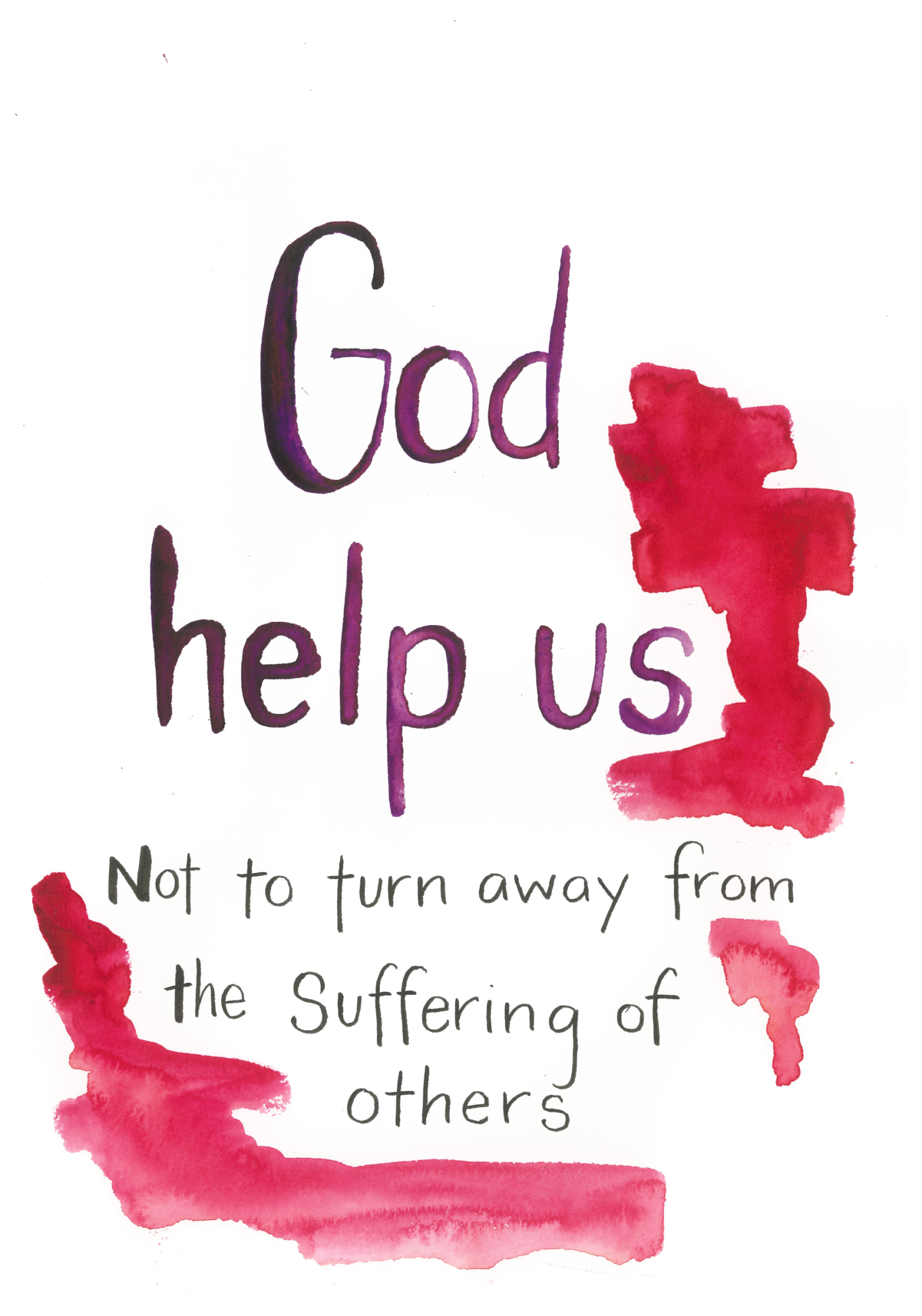The story of the Levite’s concubine, told in Judges 19–21, reveals the insidiousness of human evil. As we confront this terrifying text, we are invited not to turn away, but to confront the brokenness of the world and the way it wounds so many.

She is Called Women of the Bible Study Vol. 2
The Levite’s Concubine
When Evil Poses as Justice
By Rev. Dr. Lynn Japinga
Prayer
Mysterious God, in this story from Judges, we encounter the starkest evil of human behavior. Surround us with your grace and compassion as we look at things we’d rather turn our eyes away from. Give us the courage to confront what we see. Offer us the healing we need for our wounded spirits. Amen.
Key Scripture
“While they were enjoying themselves, the men of the city, a perverse lot, surrounded the house, and started pounding on the door. They said to the old man, the master of the house, ‘Bring out the man who came into your house, so that we may have intercourse with him.’ And the man, the master of the house, went out to them and said to them, ‘No, my brothers, do not act so wickedly. Since this man is my guest, do not do this vile thing. Here are my virgin daughter and his concubine; let me bring them out now. Ravish them and do whatever you want to them; but against this man do not do such a vile thing.’ But the men would not listen to him. So the man seized his concubine, and put her out to them. They wantonly raped her, and abused her all through the night until the morning. And as the dawn began to break, they let her go. As morning appeared, the woman came and fell down at the door of the man’s house where her master was, until it was light.” – Judges 19:22-26
Introduction to the Levite and his Concubine
A Levite and his concubine are traveling from Bethlehem and arrive at nightfall in Gibeah. They waited in the town square for someone to offer hospitality. An old man—a resident alien there—took pity on them and invited them to his home.
Their evening was interrupted by pounding on the door. A group of townsmen asked the owner of the house to send the Levite out so they could rape him. The host tried to divert the men by offering his virgin daughter and the Levite’s concubine instead (Judges 19:24). The men continued to demand the Levite, who finally “seized” his concubine and shoved her out the door to the mob. They raped and abused her all night, and in the morning they let her go. She crawled her way back to the door of the house and collapsed.1
In the morning, when the Levite stepped outside to leave, his concubine was lying at the door. He said, “Get up! We are going” (Judges 19:28). There was no answer. She may have been unconscious. Or dead. He took her home and then cut her into twelve pieces and sent one body part to each of the tribes of Israel, as a call to military action against the tribe of Benjamin.
Digging Deeper: The Difficult Questions Judges 19 Raises
This story is horrifying and offensive in so many ways. The host was justifiably frightened, but how could he blithely offer his daughter to a gang of rapists? The Levite’s actions were even more disturbing. He expressed no grief or sadness. His callous words—“Get up, let’s go”—are some of the most unfeeling, insensitive words in Scripture.
The woman’s story is profoundly sad. She was “given” and “taken,” regardless of her wishes. She had no voice, until finally her body parts were allowed to “speak” about her death. Even then, they told the Levite’s story, not hers.
The story raises many difficult questions. Why did the men offer up women to be raped? Why was it more important to protect the men than the women? Why was the Levite so callous? Some commentators’ attempts to answer these questions and justify the men’s behavior can be almost as horrifying as the actions themselves.
Commentators have concluded that when the men offered women to the rapists, it was not mere self-protection, but an attempt to avoid the sin of “unnatural sex.” It was worse for men to be raped, partly because women had less value, but also because when women were raped, the sex was at least “natural.” This perspective made their actions understandable, though not excusable.2
Earlier commentators like Matthew Henry and Thomas Morgan argued, based on a mistranslation of a word in Judges 19, that the concubine’s “adulterous behavior” justified the gang rape. The penalty for adultery was death, and although she had escaped punishment at the time, now she was paying the price. This approach tries to mitigate the horror of the story by claiming that the victim deserved it.
Other commentators suggest that she died of shame. Josephus, a first-century Jewish commentator, said she was so ashamed of being raped that she could not face her husband, so she chose to die rather than ask him to accept her when she was “damaged goods.” It is disturbing to realize how pervasive and long standing is the idea that women should feel it is their fault that they have been raped.3 The Levite threw her out to the mob, but she was the one who died of shame!
This is not an inspirational text. There is no good news amid the murder and mayhem. And yet, the story mirrors some contemporary practices of international relations and warfare. One act of terrorism can lead to massive reprisals. People and nations are edgy and quick to react to any threat. Complete loyalty is demanded and those who question the legitimacy of a violent response are often dismissed as cowardly and unpatriotic.
She Is Called and We Are Called
“God, why did you do this?” The Israelites consulted God when it seemed convenient, but they did not ask the right question. They asked who should go first into battle and not whether they should go at all. The Israelites also failed to take responsibility for their actions, preferring to blame God for the loss of the Benjaminites. Perhaps the most powerful and relevant aspect of this text is that it so vividly exposes both the futility of violence and the ways in which people try to justify their actions by claiming they were doing God’s work.
“Women and children?” Thousands of innocent women and children were killed in these chapters. Similarly, in the past century, innocent people have been increasingly at risk in warfare. In World War II, millions of civilians were killed by starvation, in concentration camps, or when their cities were bombed. Recent “civil” warfare in some countries has actually encouraged the rape and murder of women and children as a way to terrify and dehumanize. When a nation is willing to inflict or permit violence toward the least powerful, it shows a blatant disregard for human life.
Similar events continue to occur. Compare, for example, the abduction of the 200 girls in Nigeria with the abduction of the girls from the festival in Judges! It is often difficult to know how to respond when violence happens in another part of the world. A religious community may not be able to solve or prevent these problems on the other side of the world, but its members might at least be informed about the problems. Perhaps their response can be nothing more than indignation, empathy, lament, and prayer, but these actions are better than silence and ignorance.
Conclusion
This text is an ugly story of human evil masquerading as righteous indignation and even compassion. It speaks the painful truth about humans behaving badly, seeking revenge, and using brutality to terrorize. After reading this story, one of my students wrote that she wished that there had been a great big “and the Lord was displeased” evaluation at the end of it. She wanted to see that God explicitly disapproved of the bad behavior displayed here.
Unfortunately, God’s displeasure is not explicit. Still, the narrator at least made it clear that this kind of ridiculous violence was no way for a community to live. Everyone did what was right in their own eyes, but their moral vision had been completely compromised.
Discussion Questions
- Why do you think this story is in the Bible? There is certainly no good news or grace here, so what purpose does it serve? Is it the word of God in any way? How?
- Consider other examples of violence against women, in warfare or other cultural conflicts. Why are women treated so badly?
- How do you see similar cycles of violence occurring in the world now? How do people try to justify their behavior?
- What surprised you in this Bible study session?
- What do you hear the Spirit saying to you/your family/your church/your community?
This chapter was adapted with permission from Lynn Japinga’s book From Widows to Warriors: Women’s Stories from the Old Testament (Westminster John Knox: Louisville, Kentucky, 2020).
References
[1] The details are similar to a story in Genesis 19, where two angels visited Abraham’s nephew Lot. The men of Sodom also wanted to rape the visitors, and Lot offered instead his two virgin daughters. The angels then blinded the men at the door, and everyone escaped. In the Judges version of the story, there were no angels. The men at the door were not blinded and the woman was not spared.
[2] See Thompson, Writing the Wrongs, pp. 179-221.
[3] In the fourth season of Downton Abbey, the lady’s maid Anna was brutally raped by a visiting man-servant. Anna said repeatedly in the following episodes that she felt dirty and ashamed and at fault.
Rev. Dr. Lynn Japinga is professor of religion at Hope College. She received an MDiv from Princeton Theological Seminary and a PhD from Union Theological Seminary. She was ordained in 1984 and has served interim pastorates at Woodcliff Community in North Bergen, New Jersey; First Reformed in Union City, New Jersey; and Hope Church in Holland, Michigan. She is the author of Feminism and Christianity: An Essential Guide; Loyalty and Loss: The Reformed Church in America, 1945–1994; and Preaching the Women of the Old Testament. She has also written two Bible study books on women in the Old and New Testaments, published in 2020. Lynn has served on numerous denominational committees, most recently the Commission on History.
Continue this Bible study as a book
Get your copy of the She Is Called Women of the Bible Study Vol. 2

This Bible study is from the second book in the Women of the Bible Study Series. Get the book to discover how women like Mary and Martha, Abigail, and Junia embraced God’s call for their lives.